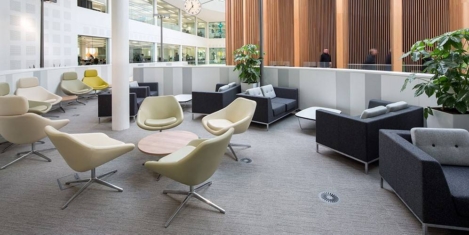To provide the best experiences, we use technologies like cookies to store and/or access device information. Consenting to these technologies will allow us to process data such as browsing behaviour or unique IDs on this site. Not consenting or withdrawing consent, may adversely affect certain features and functions.
The technical storage or access is strictly necessary for the legitimate purpose of enabling the use of a specific service explicitly requested by the subscriber or user, or for the sole purpose of carrying out the transmission of a communication over an electronic communications network.
The technical storage or access is necessary for the legitimate purpose of storing preferences that are not requested by the subscriber or user.
The technical storage or access that is used exclusively for statistical purposes.
The technical storage or access that is used exclusively for anonymous statistical purposes. Without a subpoena, voluntary compliance on the part of your Internet Service Provider, or additional records from a third party, information stored or retrieved for this purpose alone cannot usually be used to identify you.
The technical storage or access is required to create user profiles to send advertising, or to track the user on a website or across several websites for similar marketing purposes.
 The UK Green Building Council (UKGBC), together with the World Green Building Council, several European Green Building Councils, Climate Alliance and the Buildings Performance Institute Europe, has published a framework to support cities and local authorities to measure the impacts and wider benefits of building retrofit as a way of meeting their net zero targets. (more…)
The UK Green Building Council (UKGBC), together with the World Green Building Council, several European Green Building Councils, Climate Alliance and the Buildings Performance Institute Europe, has published a framework to support cities and local authorities to measure the impacts and wider benefits of building retrofit as a way of meeting their net zero targets. (more…)








 The
The 
 There are 38 ways to win an argument. That is according to the 19th Century German philosopher Arthur Schopenhauer who laid them out in an essay called
There are 38 ways to win an argument. That is according to the 19th Century German philosopher Arthur Schopenhauer who laid them out in an essay called 
 A series of reports published by the International Longevity Centre UK (ILC) highlights the economic opportunities of longer lives across Europe. According to
A series of reports published by the International Longevity Centre UK (ILC) highlights the economic opportunities of longer lives across Europe. According to 
 The pandemic has not led to mass unemployment as many feared, but has instead driven wider shifts that have increased employment among younger women, but pushed many men and older workers out of the labour market altogether, according to new research.
The pandemic has not led to mass unemployment as many feared, but has instead driven wider shifts that have increased employment among younger women, but pushed many men and older workers out of the labour market altogether, according to new research. 
 New research, ‘
New research, ‘




 Ricoh UK has published a report called
Ricoh UK has published a report called 
 The so-called green agenda, sustainability and climate change have finally hit centre stage. Various announcements are being made by UK Government and numerous high profile figures are crying a call to action to implement carbon reduction plans now. Lord Mayor of the City of London, Alderman William Russell, stated at the
The so-called green agenda, sustainability and climate change have finally hit centre stage. Various announcements are being made by UK Government and numerous high profile figures are crying a call to action to implement carbon reduction plans now. Lord Mayor of the City of London, Alderman William Russell, stated at the 
 According to
According to 








December 14, 2021
Drawing on internal skills can help firms cope with Great Resignation
by Mike Baker • Comment, Workplace